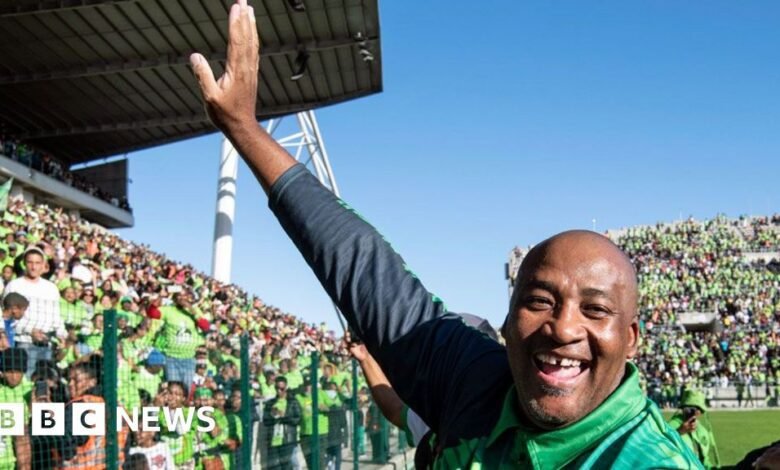Gayton McKenzie – From ex-gangster to South Africa’s minister of sports and arts

Image source, Getty Images
- Author, Rafaela Williams
- Paper, BBC News, Johannesburg
Former gangster and bank robber turned nightclub owner and opposition politician, Gayton McKenzie is now South Africa’s Minister of Sports, Arts and Culture.
President Cyril Rampahosa appointed Mr McKenzie – the leader of the Patriotic Alliance (PA) – to the portfolio of the multi-party government he announced on Sunday after his African National Congress (ANC) lost its parliamentary majority in the May 29 election.
A prolific tweeter, the 50-year-old took advantage of his appointment, posting a photo of himself wearing football boots and, with a touch of humor, writing: “Thanks for all the well wishes, will respond soon. I’m busy preparing, I have work to do 🥅 ⚽️.”
For Mr McKenzie’s admirers, his appointment is the latest sign of how he has overcome adversity to achieve success. He robbed his first bank before he turned 16, then became, as he put it in an interview with a local radio station, a full-fledged gangster, spent seven years in prison and vowed to change after his release.
Image source, Getty Images
The club later closed, as did a branch in Cape Town registered in Mr McKenzie’s name following legal action over alleged unpaid rent and electricity, according to news website IOL.
These days, Mr McKenzie is best known as a politician, having launched the AP in 2013, with Mr Kunene as his deputy.
More than a decade later, the party won 2% of the national vote and performed better in the provincial government elections in the Western Cape, winning 8%.
Their support came mainly from Coloureds, as mixed-race people are known in South Africa.
The AP’s signature slogan is “Ons baiza nie”, an Afrikaans phrase that can be loosely translated as “We are not afraid”. Afrikaans is widely spoken in the Coloured community, which makes up about 8% of South Africa’s population.
“For the first time, there are people of colour also going to parliament through the Patriotic Alliance. We are the only party that takes all races to parliament,” Mr McKenzie said after the results were announced.
Political analyst Kagiso Pooe told the BBC that Mr McKenzie had a “bravado” style that appealed to his electorate.
“People want to believe and see someone who comes from the same kind of background as them and is not ashamed to say, ‘This is who I am.’ You see that with people like President Zuma, President Trump and other personalities,” he said.
Mr. McKenzie’s campaign against undocumented immigrants was a victory for him, the analyst added.
“Unfortunately, mainstream politicians and parties have shied away from this and he addresses the issue directly.”
Mr McKenzie’s critics have denounced his campaign as xenophobic. He waged it under the slogan “Mabahambe”, which in Zulu means “They must leave” – and in a publicity stunt he visited the border with Zimbabwe to scare away people trying to cross into South Africa.
He has also been accused of hypocrisy, as his critics have pointed out that in the 2013 SABC interview he described immigrants from other parts of Africa, including Zimbabwe, as an “integral” part of South Africa’s economy, whereas “the problem with us black people, who I’m talking about here, is that we are lazy”.
When Mr Ramaphosa began negotiations on forming a coalition government, Mr McKenzie said publicly that he wanted his deputy to head the Ministry of Home Affairs, which is responsible for immigration.
He sought the Ministry of Police for himself as he said his former life as a gangster put him in a good position to deal with South Africa’s high crime rate.
Image source, Getty Images
He was unfazed when he failed to get the job, saying he had actually asked the Sports Ministry in “secret” negotiations with the ANC.
“Sports can be used to change children’s lives. A child in sport is a child off the court,” he said.
“There is a promise I made: I will make the spinning [of cars] one of the biggest sports in this country,” he added in a Facebook Live post.
Car spinning is a well-known motor sport in South Africa. It involves vehicles being driven in circles and a driver exiting the vehicle to perform stunts.
But there are many unregulated events and, as IOL sports journalist John Goliath wrote, stigma still surrounds them, as many people in black, indigenous and black neighborhoods often spin in the streets, which is seen as dangerous.
“The practice of spinning tyres began in the townships as a ritual to honour gangsters killed during the apartheid era,” he said.
Mr McKenzie promised to make it possible for the car flipping to take place in a safe environment and help keep young people away from gangsterism and drugs.
“Spinners will be recognized,” he said, adding: “When a kid is interested in cars, he doesn’t have time for drugs. He only cares about his car.”
But Mr Ramaphosa’s decision to give Mr McKenzie a seat in his cabinet is politically risky as he is at the centre of an investigation ordered by the Western Cape government, which is controlled by the Democratic Alliance (DA), a fierce political rival of the AP.
Until last year, Mr McKenzie was mayor of the Central Karoo and was accused of failing to account for 3 million rand ($161,000, £127,000) raised at a lavish gala dinner in 2022 to improve public services, including repairing swimming pools and replacing bucket toilets.
According to local media, a court ordered him to declare certain financial records to investigators last month — just weeks before his promotion to the cabinet.
The prosecutor kept up the pressure by picketing last week in the small town of Beaufort West, which is part of the Central Karoo, to demand answers about the money.
“The truth will come out. I have nothing to hide,” he said, adding: “Lies have short legs.”
More stories about the South African elections:
Image source, Getty Images/BBC



